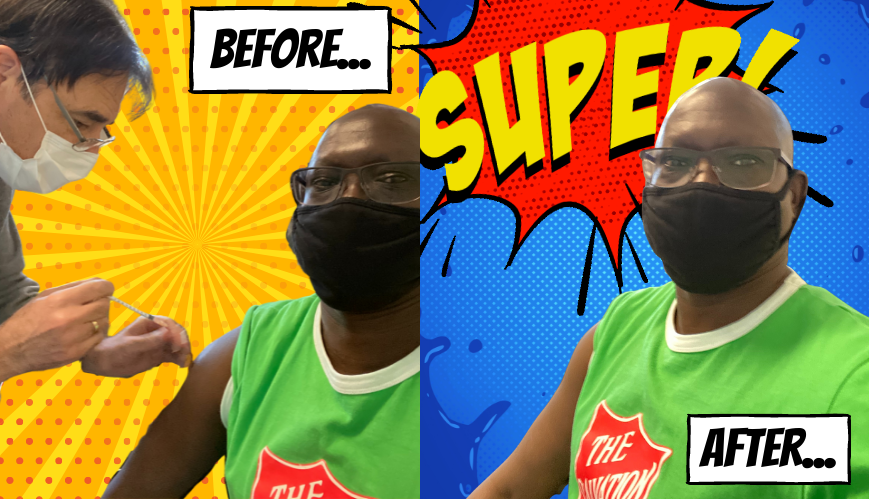Dit leads by example in the CALD community

Dit leads by example in the CALD community
7 September 2021
Captain Dit Chokeun received his second COVID-19 vaccination last week, leading the way in a ‘super’ fashion for the South Sudanese and other members of the CALD Community.
When Captain Dit Chokeun came to Australia in 2005, he was ready to make a home for his family. Fleeing South Sudan years earlier, Dit was struck by the individual way Aussies navigated life and conflict. After all, in Sudanese culture, community is everything.
Sixteen years later, Dit spends his days helping his South Sudanese brothers and sisters at The Salvation Army Brunswick Asylum Seeker and Refugee Service. As an assistant officer at the Melbourne service, he helps this vulnerable community seek a home in Australia. But with half the country now in lockdown due to COVID-19, he sees clients impacted in a whole new way.
“We are a very, very open community. And [at the service] we are trying to show people how to cope with COVID-19 because we can’t go more than five kilometres from our homes,” he explains. “It’s hard because, in our community, we are used to sitting together.”
Every week, Dit and Major Karen Elkington, the service’s manager, support hundreds of refugees and asylum seekers living in Melbourne’s northern and western suburbs. Their clients form a large part of the Culturally and Linguistically Diverse (CALD) community the government is working with to share information about the latest COVID-19 restrictions and vaccinations. That’s where Dit, Karen and their team bridge the gap.
“People get really confused because they’re getting information about what’s happening overseas with their families [as well as through the Australian news],” explains Karen. “So, there’s confusion mixed with poor mental health, like post-traumatic stress disorder and OCD. And then you add in bad press about vaccinations in Australia, which concerns everybody – so the CALD community don’t necessarily know if they can trust what is going on.”
During the first lockdown, many clients locked themselves at home and compulsively cleaned – not even coming to receive support because they were scared it was illegal. Their overall health deteriorated, and families of up to 10 people struggled to live in one house. For a group of people already ineligible to receive any Centrelink payment, it was a nightmare.
Thankfully, things have begun to shift in Lockdown 6. Open conversations and some bilingual education materials mean clients can be better informed about their rights and regulations. Plus, the staff at the Asylum Seeker and Refugee Service and community leaders lead by example. Dit received his second COVID-19 vaccination last week and wants to model the South Sudanese value of respecting authority to his people.
“In the Sudanese community, we always listen to the authorities. As leaders in the community, we encourage people to listen to the government,” he said.
The same premise goes for the Iranian community, which makes up more than 50 per cent of the service’s clients. Karen, Major Colin Elkington (chaplain) and Kevin Amiri (ministry assistant) have all received their vaccinations. They prioritise gentle conversations with clients about how it benefits entire families. In doing so, they must overcome religious, cultural and language differences.
Meanwhile, they find that social stigma about refugees and asylum seekers makes their community feel ostracised and ineligible for support. And that’s where the ‘everyday Salvo’ can make a difference.
“People think that refugees get a whole stack more than everyone else. A car, a house ... I don’t know where that urban myth came from, but people still believe it. In reality, there is very limited support for our people,” says Karen. “So, if you see someone from a culturally diverse background, smile behind your mask and say good morning!”
It’s a simple way to recognise the image of God in another human. And Dit promises that you will be rewarded a hundredfold once lockdown is over and restrictions are eased. It’s the Sudanese way!
“We are an open community,” says Dit. “If you say hi, then I can call you. We will give you lots of food!”